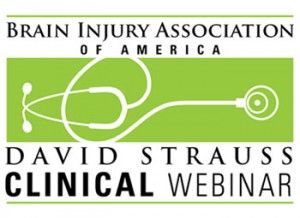2022.02.24 – Sexuality and Intimacy After Brain Injury: Changing Attitudes and Changing Practice (Recorded Webinar)
A David Strauss Memorial Clinical Lecture recorded webinar featuring Kathryn Farris, OTR/L.
To download the webinar, choose the “Download Now” option from the dropdown below. After completing the checkout process, you will receive an email with further instructions and a file that includes information about receiving your ACBIS CEU.
Aired live on February 23, 2022. Includes 1 ACBIS CEU.
Note: A certificate of attendance/ACBIS CEU certificate will not be available with the purchase of this webinar after February 28, 2025.
In this David Strauss Memorial Lecture webinar, Kathryn Farris, OTR/L discusses these issues with a focus on biopsychosocial factors, types of sexual dysfunction, the impact on the person with a brain injury, and their partners, cultural and interpersonal considerations, and approaches to communication.
This session will help establish a foundation of knowledge with sexuality and intimacy after brain injury and provide strategies to integrate into clinical practice to support long-term outcomes for individuals living with brain injuries.
Learning Objectives
- Discuss how brain injury can influence sexuality and intimacy for the survivor and partner.
- Identify 3 considerations and strategies when integrating sexuality into everyday clinical practice in brain injury rehabilitation.
- Discuss roles of the healthcare team, and methods to increase staff confidence, in addressing sexuality after a brain injury.
Speaker Bio:
Kathryn Farris, OTR/L, Clinical Education Coordinator; Acquired Brain Injury Program, Shepherd Center- Atlanta, GA
Kathryn Farris, OTR/L received her Occupational Therapy degree from College of St Catherine in 1993 and has specialized in rehabilitation of the acquired brain injury population. She joined Shepherd Center in 2001. Her current role as the Clinical Education Coordinator across the brain injury program at Shepherd Center entails professional education development and dissemination, development and management of patient/family education platforms, facilitation of competency-based training, and brain injury program development. She works collaboratively with Brain Injury leadership and the community to identify and provide resources to enhance the care of people with brain injuries, facilitation of evidence-based standards of care, and support of quality improvement initiatives at Shepherd Center. Kathryn leads a multi-center TBI Model Systems clinical leadership project assessing clinical practices and developing a professional education curriculum for sexuality and intimacy in brain injury rehabilitation. She has presented regionally and nationally on numerous brain injury and rehabilitation topics and is an active participant in American Congress of Rehabilitation Medicine Brain Injury Task Forces.


